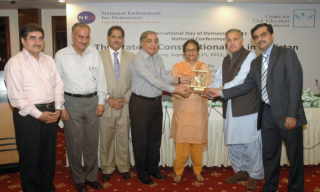Sep 15, Islamabad: A human rights veteran and President of Supreme Court Bar Association (SCBA) Asma Jahangir urged upon the state institutions to work within their constitutional parameters. She also rejected recent observations of the apex court that the federal government had failed. “I am very critical of the government, but if I am a judge it would be most inappropriate to say the government has failed,” she observed speaking at national conference on ‘The State of Constitutionalism in Pakistan,’ organised by Centre for Civic Education Pakistan to celebrate International Day of Democracy. The SCBA president said the role of judiciary was to listen to the arguments and make decisions. “We have fought against the presidential powers under 58 (2-b). Should we now give such powers to the judiciary or the GHQ,” she questioned. She argued the electorates of Pakistan had an exclusive authority to decide whether the government had failed or not. She said the people of Pakistan were empowered to give their verdict against the government either at the streets or at the polling stations. “The Chief Justice or General Kiyani is not supposed to take this decision,” she said adding the country could not be run on the personal likes and dislikes of some individuals or institutions. However, she recognised the importance of a strong judiciary in Pakistan. “The judiciary and democracy are essential for each other. If someone says the judiciary can flourish in the absence of democracy, it is absurd.” Hailing the efforts of CCEP to create public awareness about the constitution and democracy, she said the Constitution was an asset of the nation. “We have been endeavouring for a long time. We faced imprisonment but never abandoned our struggle for the supremacy of the Constitution.” She observed the Constitution and the political parties saved Pakistan from becoming a failed state. “Political parties are the national assets. I don’t say the political parties are perfect. There are a lot of faults. It doesn’t mean we should eliminate them. We must raise our voice for the reforms of political parties.” She excoriated General Musharraf for destroying the civil and military bureaucracies and urged upon the people of Pakistan to abandon the practice of confrontation at every level. “Let’s move forward from the confrontation to constructive opposition. Build consensus as we have to live with democracy. This is not always a good system. It has thorns and rocks, but its flows like a water. If you halt the system the society will contaminate,” she concluded. Dr Jaffar Ahmed of Karachi University talked about the post 18th amendment scenario and rejected the arguments that the decentralisation would undermine the sovereignty of Pakistan. “Why do we think that provinces would act against the country? Why we consider the provinces are anti-Pakistan? Pakistan was created by the provinces, he argued. Renowned journalist and anchor, Iftikhar Ahmed, deplored that internet and computers have replaced books. He said the military dictators always claimed to get rid of the “corrupt politicians,” but in turn they promoted the culture of moral and financial corruption. Dr. Khadim Hussain, Managing Director of Baacha Khan Trust Education Foundation, said the people who had framed the 1973 Constitution assured that it reflected the aspiration of the people. He said that collective will was required to uphold the supremacy of the Constitution. Eminent analyst and journalist, Raza Rumi, said in order to progress as a democracy it was important to cultivate the relations between citizens and the Constitution. He told the audience that more than 50 percent of the population of Pakistan was under the 26 years of age. He observed the 18th amendment was a step to strengthen the democratic rule that recognised linguistic and ethnic identity of the people of Pakistan. He criticised the political leadership for not taking full benefits of the 18th amendment. Senior journalist from Quetta, Shahzada Zulfiqar, said the Constitution guaranteed freedom of speech and other fundamental rights of the people. In his concluding remarks, Zafarullah Khan said there were 28 federal countries in the world. Quoting data from 14 federal countries he said the federating units in those countries were given powers to legislate freely in numerous fields including education. He observed the centralisation of power would never let the countries progress in the longer run. He questioned what Pakistan had gained while having a strong central government. During the conference, the Centre for Civic Education (CCEP) presented Civic Courage Award to Asma Jahangir and Civic Education Awards to educationist Noor Amna Malik and writer and researcher Aqeel Abbas Jaffri to recognize their services for democracy, rule of law and civic education. The CCEP also distributed among the participants specially designed literature on democracy and constitutionalism which include booklets, newsletters and a documentary.
Archives
- August 2018 (1)
- November 2017 (6)
- August 2016 (1)
- February 2016 (5)
- November 2014 (3)
- September 2013 (1)
- April 2013 (1)
- November 2012 (1)
- October 2012 (1)
- September 2012 (5)
- August 2012 (1)
- May 2012 (2)
- November 2011 (2)
- October 2011 (1)
- September 2011 (4)
- August 2011 (3)
- July 2011 (1)
- June 2011 (1)
- April 2011 (1)
- March 2011 (1)
- February 2011 (3)
- November 2010 (3)
- September 2010 (1)
- August 2010 (16)
- May 2010 (3)
- March 2010 (1)
- December 2009 (1)

